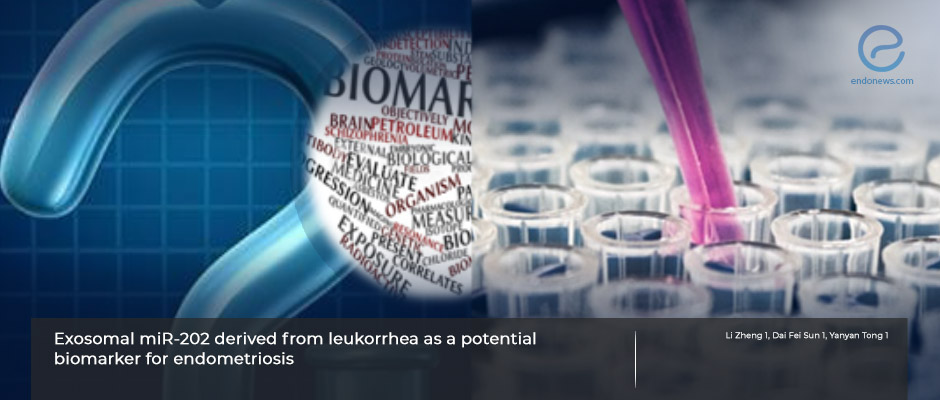A new potential biomarker proposal from leukorrhea of endometriosis patients
Jul 17, 2023
The study investigates exosomal miRNAs in leukorrhea for early detection of endometriosis
Key Points
Highlight
- Leukorrhea-derived exosomal microRNAs as potential non-invasive diagnostic biomarkers for endometriosis are investigated.
Importance
- Endometriosis diagnosis often requires invasive laparoscopic surgery, leading to patient reluctance.
- Non-invasive diagnostic methods, like exosomal miRNAs from leukorrhea, are desired for improved patient participation and early disease detection.
.What's done here
- Samples were collected from 11 patients diagnosed with endometriosis and 11 negative controls with other gynecological conditions or healthy women.
- Exosomes were isolated from endometrial cells and leukorrhea.
- MicroRNA microarray analysis was performed to identify differentially expressed miRNAs between endometriosis and control groups.
- Validation of key miRNAs was done using RT-qPCR in both endometrial cells and leukorrhea-derived exosomes.
Key Results
- Hsa-miR-202-3p and hsa-miR-202-5p were significantly upregulated in exosomes from endometriosis patients compared to controls.
- Validation of these miRNAs in leukorrhea-derived exosomes from endometriosis patients further confirmed their potential as diagnostic biomarkers for endometriosis.
Strengths and Limitations
- Novel approach investigating leukorrhea-derived exosomal miRNAs for endometriosis diagnosis, and the potential for non-invasive diagnostic tool development are the strengths.
- The limitations include a small sample size and further need to explore the underlying mechanisms and the diagnostic value of exosomal miRNAs in endometriosis patients' clinicopathological features.
Lay Summary
Endometriosis is typically diagnosed through laparoscopic surgery, which can be invasive and discourages some patients from participating. Therefore, there is a need for a non-invasive diagnostic method.
Exosomes, small vesicles containing biological information, can be found in almost every type of body fluids. They have been extensively studied for their role in diseases and as potential diagnostic and prognostic biomarkers. Specifically, exosomal microRNAs (miRNAs) have shown promise as diagnostic markers for various inflammatory disorders and cancers. A recent study reported that specific serum-derived exosomal miRNAs are significantly upregulated in patients with endometriosis and may serve as potential diagnostic biomarkers.
To investigate further, Zheng et al from China conducted a study to explore the potential utility of exosomal miRNAs from vaginal discharge (leukorrhea) as diagnostic biomarkers for endometriosis. The study was published in the January 2023 issue of the Journal of International Medical Research.
Ectopic endometrial tissue and leukorrhea samples were collected from 11 endometriosis patients and 11 women with other gynecological conditions or who were healthy, which formed the negative control group. Exosomes were isolated and analyzed using miRNA microarrays. Transmission electron microscopy and western blotting confirmed the presence of exosomes, and miRNA microarray analysis identified 217 differentially expressed miRNAs between the groups. Subsequent validation using quantitative reverse transcription polymerase chain reaction (RT-qPCR) confirmed the findings.
Among these miRNAs, hsa-miR-202-3p, and hsa-miR-202-5p were significantly upregulated in exosomes derived from endometrial cells and also leukorrhea of patients with endometriosis compared to the control group. These miRNAs have been associated with various diseases, including cancers and cardiovascular disorders. The authors suggest that leukorrhea-derived exosomal hsa-miR-202-3p and hsa-miR-202-5p could potentially serve as diagnostic biomarkers for endometriosis. Other exosomal miRNAs did not differ significantly between the groups. It is also indicated that miRNAs obtained from leukorrhea are a better reflection of the local microenvironment within the uterus and its adjacent structures compared to miRNAs obtained from circulating exosomes.
The authors conclude by saying that the exosomal miRNAs from leukorrhea may hold promise as non-invasive diagnostic biomarkers for endometriosis. The research sheds light on the potential of exosomes and miRNAs as valuable tools for diagnosing this condition, providing a less invasive alternative to laparoscopic surgery for patients with suspected EMS. However, further research and validation are necessary before these exosomal miRNAs can be implemented as routine diagnostic markers.
Research Source: https://pubmed.ncbi.nlm.nih.gov/36597409/
endometriosis leukorrhea microRNA exosomal miRNA biomarker

